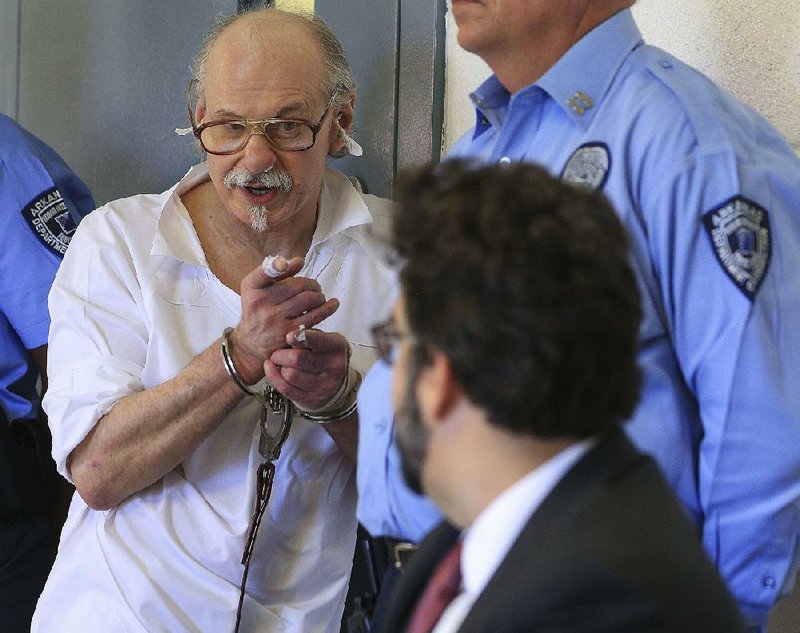The execution of Arkansas' oldest death-row inmate, set for Thursday night, was stayed by the Arkansas Supreme Court on Tuesday so that Jack Greene's attorneys can continue their appeal for a new mental-health evaluation.
Attorney General Leslie Rutledge decided against appealing the outcome to the U.S. Supreme Court or asking the Arkansas justices to reconsider, a spokesman said, in effect quashing the chance the execution would be carried out as planned.
"We will proceed with addressing the merits of Greene's appeal in the state Supreme Court," said Rutledge spokesman Judd Deere. A final decision in that case likely will take months.
Federal defenders representing Greene, 62, have argued that he fails to rationalize his impending execution, and that he instead focuses on delusions of torture by the state prison system. Speaking for himself, Greene has said his attorneys are part of the conspiracy against him.
[DEATH PENALTY: Interactive tracks allexecutions in U.S. since 1976]
In court papers filed hours before the Arkansas Supreme Court's decision, attorneys from Rutledge's office pointed out the "macabre horror" of Greene's crime: In 1991, he bound and beat retired minister Sidney Burnett inside his Johnson County home. Investigators found a can of hominy they said had been used to beat Burnett, who also had been stabbed in his face and back.
The final violence was from gunshots in the head and chest.
Twice Greene's sentence of death was overturned, only to be delivered again for a third and final time in 1999.
Tuesday, the state Supreme Court, in a 5-2 decision, sided with Greene's attorneys in their request for more time to examine the mental health of a condemned man who spent two decades in a maximum-security prison.
A one-page order handed down shortly after 4 p.m. did not explain the high court's reasoning. Justices Rhonda Wood and Shawn Womack indicated they would have rejected the request for a stay.
Greene was informed of the decision late Tuesday in a phone call with his federal attorney, John Williams, who declined to say how the prisoner reacted to the news.
"We're pleased the Supreme Court has recognized the gravity of this case," Williams said.
The request for a stay came in Monday's appeal of a Jefferson County circuit judge's decision last week to dismiss Greene's lawsuit against the Department of Correction.
Greene's attorneys had challenged a state law that leaves it up to the state prisons director -- currently, Wendy Kelley -- to determine if condemned inmates are mentally incompetent to be executed.
Kelley had declined a request to declare Greene incompetent, and in response his attorneys filed suit seeking an independent mental-health evaluation. Their appeal is set to last into next year, and they requested the stay to allow themselves time to work on the case.
In an emailed statement, Rutledge called the ruling "delayed justice," and promised to continue the legal fight on behalf of Burnett, his widow and children. In his own statement, Gov. Asa Hutchinson also invoked the Burnett family.
"Last-minute delays are always very difficult and only prolong the justice the Burnett family was promised more than 20 years ago," Hutchinson wrote.
A person who answered the phone earlier in the day at the home of Edna Burnett, Sidney Burnett's widow, said the family was not discussing the execution.
In preparation for the impending execution, Greene had been moved from his solitary cell at the Varner Supermax prison, down the road to Cummins Unit, where the state's death chamber sits.
Solomon Graves, a spokesman for the Department of Correction, said he was unaware if Greene had been moved back to Varner late Tuesday. All other preparations for the execution were put on hold, he said.
During a clemency hearing last month, Greene rambled about a conspiracy by his attorneys and prison officials to keep him from being extradited to North Carolina, where he is charged with killing his brother.
At the time of Burnett's murder, Greene was on the run from the North Carolina case. Greene confessed to those crimes and accepted responsibility for them in front of the Parole Board in October.
The Parole Board recommended against the governor commuting Greene's sentence to life in prison.
Greene told the panel that if he was not going to have his sentence reduced and be extradited to North Carolina, he would rather be executed. For now, Greene will remain in Arkansas.
In April, the Arkansas Supreme Court stayed the executions of three inmates -- out of the eight planned for that month -- including two who had claims of mental incompetence.
The Supreme Court has yet to resolve either case, which involve killers Bruce Earl Ward and Don Davis.
After a federal judge halted a fourth execution in April, Arkansas succeeded in carrying out four lethal injections, its first executions in more than a decade.
A Section on 11/08/2017
